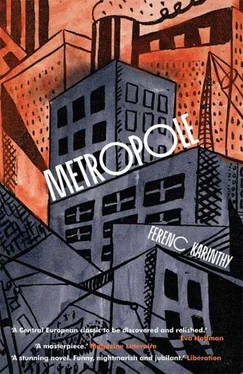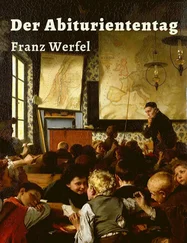At that point one of the white youths, a thickset young man in a pullover, reached across the line of boiler-suited figures and before anyone could stop him smashed a bottle in the face of a lanky black boy. There was a shattering sound — was it the bottle breaking or bones? The man who had been hit swayed about with dark red blood running down his dark face. The security men — or whatever they were — blew their whistles excitedly and tried to press forward to separate the combatants. But now, on the other side of the barrier, one of the other black boys snapped his flick-knife open, ducked under the linked hands of the guards and, lightning-quick, stabbed the man in the pullover. The man who had been stabbed looked around with a foolish, startled expression, wondering what had happened. He pressed his palm to his waist where the blade had penetrated and slowly, very slowly, fell forward and doubled up with the same blank stare of incredulity that this should have happened to him of all people. His body soon grew still in his companions’ arms, the look on his face unchanged.
A siren started outside: it would have been police or the ambulance. The girl’s blonde hair floated briefly through the mêlée, then the police burst in, their feet drumming on the stairs, using rubber truncheons to clear the way. Budai had no desire to resume his acquaintance with them. He sneaked away as best he could. However disturbing the scene had been he had not forgotten that his chief business was with Epépé. He didn’t want to be away too long since she might be back on the lifts by now. He headed back to the hotel.
She was not there so he tried the telephone in his room again. He had a few numbers now that generally answered at night and he could even recognise one or two of the voices. It was a strange, dreamlike experience conversing with someone without being able to understand a word of the language. He rang them time and again. He was nourishing a hope that the voice at the end of the line might eventually give his own number as people often did when they had been misdialled. In actual fact, of course, it was impossible to sort the mumble and jabber from the information he was seeking and yet, despite the pointlessness of the exercise, he enjoyed saying hello, asking questions, listening to the person at the other end, knowing that he too was being listened to and imagining what kind of person it was… Interestingly enough there were some people who didn’t put the phone down for a while, who, despite knowing there was no sense in carrying on the conversation, nevertheless entered the spirit of this absurd game — perverts of some sort possibly. Or maybe they were simply bored with nothing better to do.
One time though, just as he was preparing to call someone, the telephone rang. This surprised him so much he suddenly felt terrified and did not dare lift up the receiver. And once he did pick it up he was at a loss as to what language to use and was able to do no more than mutter a faint hello. It was a female voice, fast, garbled, like someone in a hurry, wanting to get a brief message through, the tone of the last-but-one syllable pitched higher than the rest, suggesting a possible question? Having recovered a little, Budai tried to explain in English, French, Russian and Chinese that he did not understand her. Her response was to repeat what she had said more slowly, accentuating each syllable, but that of course made no difference. He tried various other languages as and when they occurred to him, but the woman did not hear him through and, giving a curt laugh, cut the connection.
Who was it? What did it mean? Had someone discovered his whereabouts? Was someone at home looking for him? Might it have been the airline realising there had been a mistake? Or was it someone answering one of the notices he had put up? Could the management have received the letter he had sent them? But they would know from that that he did not speak their language, for that after all was precisely what his letter had explained. And would they be calling him this way, by telephone? Or could it be a wrong number?
Suddenly he had an idea. It must have been Bébé! Why didn’t he think of that before?! In all those trips up and down she was bound to have noticed his key with the number on it, why shouldn’t she have rung him? And if it was her she would have been wanting to tell him that she had arrived and was back on duty, waiting for him.
And indeed there she was in one of the opening lift doors, smiling and winking at him. He could hardly wait till they could be alone together. Once he was inside the lift with her he tried to mime a telephone call, dialling with his fingers, putting an imaginary receiver to his ear to show that he had received her message and had come in response to it… She smiled at him a few times while operating the lift but with a certain guardedness now. This made him wonder whether he was misinterpreting Veve’s behaviour, thinking it was intimacy when it was no more than her normal kindness.
Once they had arrived on the eighteenth Budai tried to discover her telephone number by handing her his notebook and encouraging her to write it down, air-dialling, imitating the sound of the telephone bell and so forth. But she just shrugged, smoked her cigarette and seemed to understand nothing — or maybe just pretended not to understand, not wanting to give him her number. Might it be that she did not have a telephone? And in any case, where did she live, and with whom? Did she have a husband or was she still unmarried? Did she live with her family or alone? He knew nothing about her but if he was honest with himself such facts did not interest him too much anyway. What he required from her had nothing to do with her circumstances, or if her circumstances came into it at all it was only in so far as they allowed her enough time to be occupied with him. The circumstances might be of even less importance than that since what he assumed was that the minutes they spent on the top floor were stolen by Ete from her work. He couldn’t afford the luxury of having his attention diverted, could not allow the one straw that chance had offered him to slip from his grasp. There was only one thing Budai wanted from the girl for the time being and everything else was secondary. He wanted her to be his language tutor.
They were still on numbers. He thought they might sound different because in her answers she was confusing cardinals with ordinals though these could sound very different indeed, as in one, two and first, second in English or egy, kettö and elsö, második in Hungarian… But after long, exhausting, patient and sometimes nerve-jangling questioning he did succeed in establishing — albeit uncertainly and sometimes downright dubiously — the first ten numbers. So 1 is dütch , 2 is klóz or gróz, 3 is tösh , or possibly bár , 4is dzsedirim , 5i s bár or tösh (the numbers 3 and 5 seemed to be curiously interchangeable, or it might have been that he simply couldn’t distinguish), 6 is kusz , 7 is rodj or dodj , 8 is hododj , 9 is dohododj , 10 is etsrets .
These names did not remind him of any language living or dead. True, there was some slight, if imagined, similarity between dzsedirim (4) with the Russian chitiri for the same number. Kusz (6) did sound somewhat like the Finnish kuus , and etsrets (10) recalled the Arabic asr . But these were mere coincidences. It was surprising to find the 7, 8 and 9 so clearly related to each other, though that too might owe something to misunderstanding or mishearing.
What made his life generally more difficult was that he could never be quite sure what sound he was hearing. At home he had developed a sure-fire ability to make fine phonetic distinctions as part of his work. It was just that in this city the locals employed strange articulations he had not met elsewhere. They seemed to voice words differently somehow, less clearly, not according to the normal rules — in civilised countries anyway — of enunciation. They spoke gutturally, from the throat, but not like the Chinese, Japanese or Arabs: the vowels were more murmured, their tones inconsistent; the consonants croakier, more chewed over, full of rattling, clicking noises. That seemed to point to an African language, that of the Bushmen/Hottentots, but the frequent use of tl suggested Central American Aztec. The preponderance of ö and ü sounds reminded him of Turkish. But this was all no more than impression, far short of certainty. Scholars had calculated that there were close to 3000 languages in the world. How could he relate this one to the others on the basis of such poor evidence?
Читать дальше












